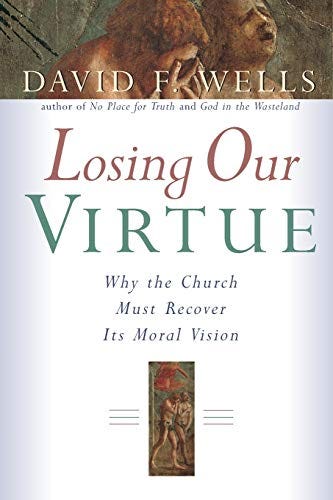The Gospel Coalition
Written by David F. Wells Reviewed By Peter Cook
David Wells has already made his mark as one of the leading commentators on postmodernism, writing from a conservative evangelical stance.
Already he has given us No Place for Truth: Whatever Happened to Evangelical Theology? and God in the Wasteland: The Reality of Truth in a World of Fading Dreams. Now we have Losing our Virtue: Why the Church must Recover its Moral Vision.
Throughout this trilogy, Dr Wells, Professor of Historical and Systematic Theology at Gordon-Conwell Theological Seminary, Massachusetts, expresses his own concern for the drifting of modern evangelicalism from its Biblical moorings into a kind of mystical evangelicalism which he calls ‘postmodern evangelicalism’.
The gist of Wells’ argument is that postmodernism as such has produced a culture which is godless, unwilling to accept that there are absolute standards, and with a moral core which is crumbling.
Losing our Virtue is predominantly an analysis of what that means in Western Society, which on the one hand is incapable of coping with the speed at which modern technology is advancing, and on the other has lost confidence in well established standards, so that it is turning in on itself and becoming increasingly narcissistic.
It has rejected the concept of sin, and has come to believe that human nature is fundamentally good albeit often maladjusted.
Its problems therefore are more psychological than moral and so it looks to therapists for all necessary help.
At the same time, being constantly bombarded by media advertising, is persuaded that all other needs are to be met by consumerism.
Alas, Wells argues, postmodern evangelicalism, instead of realising that postmodernist culture is inherently evil, and therefore to be withstood, has a tendency to go along with it.
It drinks too deep from the well of liberalism, and succumbs to consumerism by employing a kind of market-place evangelism that panders to the consumer.
It has ceased to explore in depth the great doctrines of the Bible as did its classical evangelical forbears, using them rather as stepping stones towards an ever-increasing subjectivism.
It is losing the concept of sinfulness of sin and consequently the magnitude of the Incarnation, the centrality of the cross, and the holiness and awesomeness of God who has become the Therapist Supreme.
It is losing the concept of sinfulness of sin and consequently the magnitude of the Incarnation, the centrality of the cross, and the holiness and awesomeness of God who has become the Therapist Supreme.
Wells thus maintain that there are now two evangelical spiritualities. On the one hand there is the classical which is objective, has moral weight and the capacity to be countercultural.
Postmodern spirituality on the other hand is subjective, lacking in the theological and moral backbone, and its effect on contemporary society with its desperate quest for mere secular salvation, can only be inept.
If the church has anything to say to withstand the tide of postmodernism its members must
- ‘shine as light in the world,
- holding fast to the Word of Life’ and
- develop a new apologetic (which is the classical apologetic written large) in which it can clearly be seen that the only answer to the human predicament is at the Cross of Christ.

Wells is speaking primarily to the American scene; …
… Britain has yet to experience the ‘Disneyland’ evangelism of Robert Schuller and his extravaganzas in his crystal cathedral (198), or the exegetical liberties of Donald Capps and his ‘liberation psychology’ and its shift from self denial before God towards self affirmation (199).
For many Wells will at first read seem to be overstating his case and pursuing too negative a course.
Even so his analysis of postmodern culture, well documented with a plethora of footnotes is worthy of careful consideration by all who are concerned with evangelism, while his warning against unbalanced subjectivism, and his appeal for the propagation of a fully biblical apologetic should be heeded on this side of the Atlantic as well as on the other.
Peter Cook is with Scottish Evangelical Theology Society, Edinburgh
Originally published at https://www.thegospelcoalition.org.












